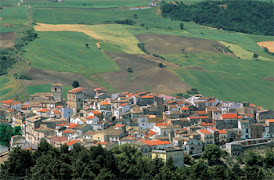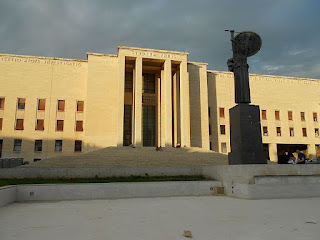Carlo Rambaldi - master of special effects
Former commercial artist who created E.T.
Carlo Rambaldi, the brilliant special effects artist who created Steven Spielberg's ugly-but-adorable Extra-Terrestrial known as E.T. and Ridley Scott's malevolent Alien, died on this day in 2012 in Lamezia Terme, the city in Calabria where he settled in later life. He was a month away from his 87th birthday. Unlike modern special effects, which consist of computer generated images, Rambaldi's creatures were typically made of steel, polyurethane and rubber and were animated by mechanically or electronically powered rods and cables. Yet his creations were so lifelike that the Italian director of one of his early films was facing two years in prison for animal cruelty until Rambaldi brought his props to the court room to prove that the 'animals' on screen were actually models. It was during this time that Rambaldi, a former commercial artist who had graduated from the Academy of Fine Arts in Bologna, not far from his home town of Vigarano Mainarda in Emilia-Romagna, pioneered the use animatronics (puppets operated mechanically by rods or cables) and mechatronics, which combined mechanical and electronic engineering. Read more…
______________________________________
Francesco Zabarella – Cardinal
Reformer helped to end the Western Schism
Cardinal Francesco Zabarella, an expert on canon law whose writings on the subject were to remain the standard authority for centuries, was born on this day in 1360 in Padua. Zabarella studied jurisprudence in Bologna and in Florence, graduating in 1385. He taught canon law in Florence until 1390 and in Padua until 1410. He took minor orders and in 1398 was made an archpriest of the Cathedral of Padua. Zabarella carried out diplomatic missions on behalf of Padua. In 1404 he was one of two ambassadors sent to visit King Charles VI of France to ask for his assistance against Venice, which was preparing to annex Padua. But when Padua became part of the Venetian Republic in 1406, Zabarella became a loyal supporter of Venice. In 1409 he took part in the Council of Pisa as councillor of the Venetian legate. The antipope John XXIII appointed him Bishop of Florence and cardinal deacon of Santi Cosma and Damiano in Rome in 1411. There were two antipopes at the time as a result of the Western Schism, which had begun in 1378 when the French cardinals, claiming that the election of Pope Urban VI was invalid, had elected antipope Clement VII as a rival to the Roman pope. Read more…
_____________________________________
Marina Berlusconi - businesswoman
Tycoon’s daughter who heads two of his companies
Marina Berlusconi, the oldest of business tycoon and former Italian prime minister Silvio Berlusconi’s five children, was born on this day in 1966 in Milan. In 2003 she became chair of Arnoldo Mondadori Editore, Italy’s largest publishing company, and in 2005 president of Fininvest, the Berlusconi holding company that is also Mondadori’s parent company. She is or at times has been a director of several other Berlusconi companies, including Mediaset, Medusa Film, Mediolanum and Mediobanca. Forbes magazine once described her as the most powerful woman in Italy and one of the 50 most powerful women in the world. Born Maria Elvira Berlusconi, her mother is Carla Elvira Lucia Dall’Oglio, a woman the businessman met for the first time at a tram stop outside Milan Centrale railway station in 1964 and married the following year, at a time when he was an enterprising but relatively obscure real estate broker. They were divorced in 1985, much to the disappointment of Marina and her brother, Piersilvio, after their father had begun a relationship with the actress Veronica Lario, who would become his second wife and the mother of his third, fourth and fifth children. Read more…
_____________________________________
Ippolito de' Medici – Lord of Florence
Brief life of a Cardinal, soldier and patron of the arts
Ippolito de' Medici, who ruled Florence on behalf of his cousin, Giulio, after he became Pope Clement VII, died on this day in 1535 in Itri in Lazio. At the age of 24, Ippolito was said to have contracted a fever that turned into malaria, but at the time there were also rumours that he had been poisoned. There were two possible suspects. The fatal dose could have been administered on behalf of Alessandro de' Medici, whose abuses he was just about to denounce, or on behalf of the new pope, Paul III, who was believed to want Ippolito’s lucrative benefices for his nephews. Ippolito was born in 1509 in Urbino, the illegitimate son of Giuliano de' Medici. His father died when Ippolito was seven and he came under the protection of his uncle, Pope Leo X. When he died five years later, Ippolito’s cousin, Giulio, who had become Pope Clement VII, sent him to Florence to become a member of the government, destined to rule the city when he was old enough. Ippolito ruled Florence on his behalf between 1524 and 1527 but then Clement VII chose his illegitimate nephew, Alessandro, to take charge of Florence instead. Read more…
___________________________________
Book of the Day: E.T. the Extra-Terrestrial: The Ultimate Visual History, by Caseen Gaines
Documenting the complete history of the film, E.T. the Extra-Terrestrial: The Ultimate Visual History explores Steven Spielberg's initial inspiration for the story, the challenging shoot, and the record-breaking success, as well as the film's endurance, examining the merchandising it inspired and the reasons E.T. holds a permanent place in the hearts of movie fans the world over. The book features exclusive interviews with key members of the creative team, including cast and crew. Filled with visual treasures, the book also includes rare and never-before-seen imagery, including on-set photography, concept art, and storyboards, plus a wealth of removable insert items, such as annotated script pages, studio memos, preliminary sketches, and more. The perfect tribute to a film that defines movie magic and the final word on a modern masterpiece.Caseen Gaines is a pop culture historian who has been published in Vanity Fair, Rolling Stone, The A.V. Club and Decider. He has written several books about popular movies and about the influence of black artists in the history of Broadway.
(To the best of our knowledge, all of Italy On This Day's posts were factually accurate at the time of writing. In the case of individuals still living, some of the information may need updating)

%20(2).jpg)

.jpg)


.jpg)
.jpg)

.jpg)

.jpg)
.jpg)


.jpg)
.jpg)

